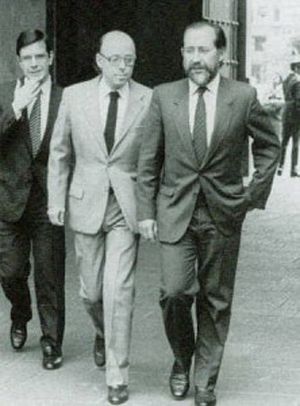Independent Democratic Union facts for kids
Quick facts for kids
Independent Democratic Union
Unión Demócrata Independiente
|
|
|---|---|
 |
|
| Leader | Evelyn Matthei |
| President | Guillermo Ramírez |
| Secretary-General | Juan Antonio Coloma |
| Chief of Deputies | Gustavo Benavente |
| Chief of Senators | Luz Ebensperger |
| Founder | Jaime Guzmán |
| Founded | September 24, 1983 |
| Headquarters | Suecia 286, Providencia, Santiago de Chile |
| Youth wing | Nuevas Generaciones UDI |
| Membership (2023) | 34,121 |
| Ideology |
|
| Political position | Right-wing |
| National affiliation | Chile Vamos |
| International affiliation | International Democracy Union |
| Regional affiliation | Union of Latin American Parties |
| Colours | Blue, White and Yellow |
| Chamber of Deputies |
22 / 155
|
| Senate |
9 / 50
|
| Regional boards |
37 / 302
|
| Mayors |
22 / 345
|
| Communal Councils |
173 / 2,252
|
| Website | |
| http://www.udi.cl/ | |
|
^ A: The party has also been described as centre-right and far-right. |
|
The Independent Democratic Union (in Spanish, Unión Demócrata Independiente, or UDI) is a major political party in Chile. A political party is a group of people with similar ideas about how to run a country. The UDI is known for its conservative and right-wing beliefs. This means it often supports traditional values and free-market economic ideas.
The party was founded on September 24, 1983, by a lawyer and professor named Jaime Guzmán. He was an important civilian who worked with the government of Augusto Pinochet. The UDI's ideas came from Guzmán's Gremialismo (Guildist Movement), which started at the Pontifical Catholic University of Chile in 1966.
Throughout its history, the UDI has often joined with other parties to form groups called coalitions. One of its main partners is National Renewal (RN). Together, they have been part of coalitions like the Alliance for Chile and, more recently, Chile Vamos. The UDI was the largest party in Chile's Congress from 2010 to 2014 and has been part of the government twice.
Contents
History of the UDI
The story of the UDI party is closely linked to the history of Chile over the last 50 years.
How the Party Began (1967–1988)
The UDI's roots go back to the 1960s at the Pontifical Catholic University of Chile. A law student named Jaime Guzmán started a group called the Movimiento Gremial (Guildist Movement). He and his followers believed that student unions and other community groups should focus on their own goals without getting involved in national politics. This movement became very popular at the university.
Guzmán supported the 1973 military coup that brought General Augusto Pinochet to power. He became a close advisor to Pinochet and helped write Chile's new constitution in 1980.
In 1983, Guzmán decided to create his own political movement. He founded the Independent Democratic Union Movement on September 24. Unlike other right-wing groups at the time, the UDI focused on connecting with people from all social classes, including the poor. They wanted to build support across the country.
In 1987, the UDI briefly joined with other right-wing groups to form a single party called National Renewal (RN). However, the UDI members felt their ideas were different, so they left RN a year later. In 1989, Jaime Guzmán officially registered the UDI as its own political party.
A New Era in Chilean Politics (1988–1989)
In 1988, Chile held a special vote called a plebiscite to decide if Pinochet should remain in power. The UDI supported the "Yes" vote for Pinochet to continue. However, the "No" vote won, which led to presidential elections the next year.
For the 1989 election, the UDI joined with National Renewal to support a single candidate, Hernan Büchi. He lost to Patricio Aylwin, the candidate from the center-left coalition. In the same year, the UDI won 14 seats in the Chamber of Deputies and two seats in the Senate. Jaime Guzmán was elected as a senator for Santiago.
Growth and Challenges (1989–2003)

In the early 1990s, Jaime Guzmán became a leading voice of the opposition to the new democratic government. On April 1, 1991, Guzmán was killed by members of an armed left-wing group. This was a major event for the party and the country.
After this difficult time, the UDI began to grow. At first, it was smaller than its partner, National Renewal. But in each election, it gained more and more votes. By the 2001 election, the UDI had become the largest political party in Chile.
In the 1999 presidential election, the UDI's candidate was Joaquín Lavín. He ran against Ricardo Lagos from the center-left coalition. The election was extremely close. In the end, Lavín lost by a very small margin, receiving 48.7% of the vote in the final round. This was the best result for a right-wing candidate in Chile for many years.
Working with Other Parties (2003–2006)
During the 2000s, the UDI and its main partner, National Renewal (RN), sometimes had disagreements. Both parties wanted to be the leader of their coalition, the Alliance for Chile. This led to some tension between their leaders.
In the 2005 presidential election, the UDI once again chose Joaquín Lavín as its candidate. However, RN decided to run its own candidate, Sebastián Piñera. Because they couldn't agree on one person, the right-wing vote was split. Piñera came in second place and went on to a final round against Michelle Bachelet. Lavín supported Piñera, but Bachelet won the election.
Recent History (2006–Present)
During Michelle Bachelet's first term as president (2006–2010), the UDI was the largest party in Congress and acted as the main opposition.
For the 2009 election, the UDI and its partners united behind one candidate, Sebastián Piñera. This time, he won, becoming the first right-wing president of Chile since the return to democracy. Many UDI members served in important government roles during his administration (2010–2014).
In the 2013 election, the UDI's candidate was Evelyn Matthei. She lost to Michelle Bachelet, who returned for a second term. During Bachelet's second presidency (2014–2018), the UDI was again a major opposition party. In 2015, the party helped form a new coalition called Chile Vamos, which also includes National Renewal and other parties.
The party faced some challenges and controversies during these years. Despite this, the UDI performed well in the 2016 local elections, showing it still had strong support.
For the 2017 election, Chile Vamos again supported Sebastián Piñera, and he won a second term. In the 2021 election, the coalition's candidate was Sebastián Sichel, who was not a member of UDI, but he lost in the first round.
Presidential Candidates Supported by UDI
Here is a list of the presidential candidates the UDI has supported over the years.
- 1988 Plebiscite: "Si" (for Pinochet to continue) (Lost)
- 1989: Hernán Büchi (Lost)
- 1993: Arturo Alessandri Besa (Lost)
- 1999: Joaquín Lavín (Lost)
- 2005: Joaquín Lavín (Lost)
- 2009: Sebastián Piñera (Won)
- 2013: Evelyn Matthei (Lost)
- 2017: Sebastián Piñera (Won)
- 2021: Sebastián Sichel (Lost)
- 2025: Evelyn Matthei
Party Emblems
The UDI has used several different logos throughout its history.
See also
 In Spanish: Unión Demócrata Independiente para niños
In Spanish: Unión Demócrata Independiente para niños
- Christian democracy
- Neoliberalism
- People Power Party (South Korea)
- Pinochetism
 | John T. Biggers |
 | Thomas Blackshear |
 | Mark Bradford |
 | Beverly Buchanan |





